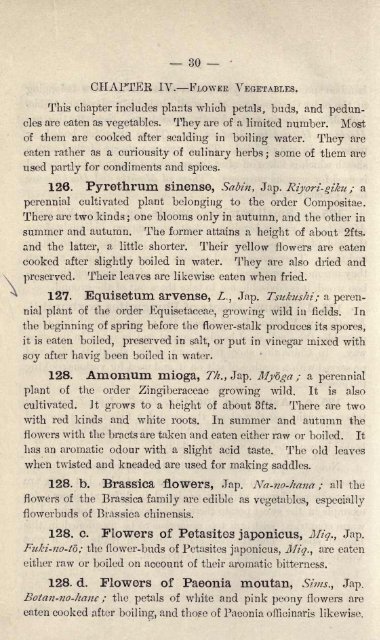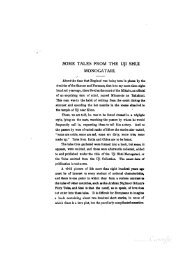Untitled - University of Oregon
Untitled - University of Oregon
Untitled - University of Oregon
Create successful ePaper yourself
Turn your PDF publications into a flip-book with our unique Google optimized e-Paper software.
30<br />
CHAPTER IV. FLOWKB VEGETABLES.<br />
This chapter includes plants which petals, buds, and peduncles<br />
are eaten as vegetables. They are <strong>of</strong> a limited number. Most<br />
<strong>of</strong> them are cooked after scalding in boiling water. They are<br />
eaten rather as a curiousity <strong>of</strong> culinary herbs ; some <strong>of</strong> them are<br />
used partly for condiments and spices.<br />
126. Pyrethrum sinense, Sabm, Jap. Riyori-giku; a<br />
perennial cultivated plant belonging to the order Compositae.<br />
There are two kinds; one blooms only in autumn, and the other in<br />
summer and autumn. The former attains a height <strong>of</strong> about 2fts.<br />
and the latter, a little shorter. Their yellow flowers are eaten<br />
cooked after slightly boiled in water. They are also dried and<br />
\preserved.<br />
Their leaves are likewise eaten when fried.<br />
127. Equisetum arvense, L., Jap. Tsukushi; a perennial<br />
plant <strong>of</strong> the order Equisetaceae, growing wild in fields. In<br />
the beginning <strong>of</strong> spring before the flower-stalk produces its spores,<br />
it is eaten boiled, preserved in salt, or put in vinegar mixed with<br />
soy after havig been boiled in water.<br />
128. Amoinum mioga, 77/., Jap. Myoga / a perennial<br />
plant <strong>of</strong> the order Zingiberaceae growing wild. It is also<br />
cultivated. It grows to a height <strong>of</strong> about 3fts. There are two<br />
with red kinds and white roots. In summer and autumn the<br />
flowers with the bracts are taken and eaten either raw or boiled. It<br />
has an aromatic odour with a slight acid taste. The old leaves<br />
when twisted and kneaded are used for making saddles.<br />
128. b. Brassica flowers, Jap. Na-no-hana ;<br />
all the<br />
flowers <strong>of</strong> the Brassica family are edible as vegetables, especially<br />
flowerbuds <strong>of</strong> Brassica chinensis.<br />
128. c. Flowers <strong>of</strong> Petasites japonicus, Miq., Jap.<br />
Fuki-no-tQ; the flower-buds <strong>of</strong> Petasites japonicus, Miq., are eaten<br />
either raw or boiled on account <strong>of</strong> their aromatic bitterness.<br />
128. d. Flowers <strong>of</strong> Paeonia moutan, Sims., Jap.<br />
Botan-no-Jianc ; the petals <strong>of</strong> white and pink peony flowers are<br />
eaten cooked after boiling, and those <strong>of</strong> Paeonia <strong>of</strong>ficinaris likewise.

















